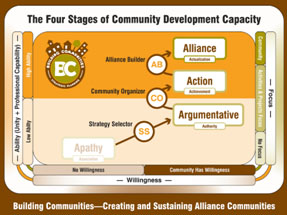Maybe You Should Apply for the Job
December 14, 2020
In the fall of 1993, a friend came to Brian to ask a favor—Baker County Treasurer Peggi Timm.
"Hey Brian. The Oregon Economic Development Department has a job opening. It is for the Regional Business Development Officer for five of our counties in Eastern Oregon. I would like to apply. They are going to call you. Can you put a good word in for me?"
Peggi Timm was amazing. She was an absolute powerhouse. Visionary. Activist. Accomplished. And a friend.
A couple of days later Brian had a 45-minute conversation with the Deputy Director of the Oregon Economic Development Department. He was doing everything he could to put in a very favorable recommendation for Peggi. He knew she would do a great job. Then the Deputy Director asked, "I just have one question for you, Brian. Why are you not applying for the job?"
Brian felt horrible. Peggi probably had the job. Only one thing prevented it—Brian. He would spend the next five years working in five counties. He was the "young man with the briefcase." His rolodex became enormous. Five counties. Tons of economic development projects. Life on the road. Five hours and 17 minutes to Salem. Five hours and 17 minutes to get back home. Some days he would do all of it in one day. And he regularly visited virtually every little community in those five counties.
What Brian learned was that Baker City and Baker County were far different from the other communities. It wasn’t “think it. Do it. Rinse and repeat.” For some communities, it was a political battle. He would learn to help such communities amidst such turmoil.
Still other communities, he learned, did not seem to even care at all. He couldn’t ignore those communities, so with those he'd just have lunch once per month and called it good. They were happy. It was confusing; how could communities behave this way? "Don’t they want to roll up their sleeves and get fun things done? Don’t they want to become better places? Don’t they want to create jobs?"

"It was confusing. How could communities behave this way? Don’t they want to roll up their sleeves and get fun things done?"
Brian expected to find communities with differing assets—something he would soon describe as "Key Success Factors." He expected communities to select different groupings of projects—something he would later describe as one of "25 Strategies." He would expect that each community was completing specific activities to reach their goals—something he would later refer to as "Action Steps." But he never expected to discover the difference in the soul of each community – something he would later describe as "Civic Condition."

"During this era the State of Oregon created something called the 'Oregon Progress Board.' It was a strategic think tank that created 'Oregon Shines.'"
During this era the State of Oregon created something called the "Oregon Progress Board." It was a strategic think tank that created "Oregon Shines," a strategic vision/plan for the future of the state.
In 1999, the Progress Board was writing their annual report. Brian's phone rang. "Brian, your community, Baker City, represents all that is good about civic advancement. We would like to feature your community on the cover page of our report."
Brian knew exactly what to do.
He called his 40 best friends. The Progress Board rented a helicopter. They all stood on that prominent location at the National Historic Oregon Trail Interpretive Center at Flagstaff Hill looking up at that helicopter. There was the photographer. That was the picture—40 people all looking up in the same direction…standing atop one of the greatest achievements in county history. United. Hopeful. Together.
During that same year, the two largest general foundations in Oregon reserved rental vans and hauled their board of directors hundreds of miles to explore what was going on in Baker City. Both foundations made gigantic grant awards to the Baker Community Partnership, an unofficial collection of volunteers collaborating on a portfolio of 10 community and economic development projects.
Baker City/Baker County was unstoppable.
